testwidget
 How it works
How it works


Referral
Refer a pregnant friend or couple to ensure their future is as secure as yours.

Consultation & Enrol
Our experts shall connect with them to explain the benefits of our service & bring them onboard.

Rewards galore
Avail Rs. 2000 cash or a free upgrade (worth `10,000) to our community banking service.
 Frequently Asked Questions
Frequently Asked Questions

Cord Blood Stem Cells have high regenerative properties & the ability to transform into blood cells, brain cells, muscle cells, bone cells etc. Currently, they are used to treat 80+ life-threatening medical conditions.
By storing the precious cord blood of your baby with LifeCell, you can now protect not just the baby but the entire family including parents, siblings, maternal & paternal grandparents for a lifetime.
One, among many, benefits of using cord blood stem cells, compared to stem cells gathered from other sources, is that cord blood is a fairly simple and non-invasive process to collect. There is absolutely no pain or risk to the mother or child.
As a result of their ability to self-renew and differentiate into different cell types, stem cells have found applications in the treatment of various diseases. Currently, cord blood stem cells are being successfully used and studied for further applications in the following areas.
1.Tissue regeneration: Stem cells find use in repair and restoration of damaged tissues or organs in case of severe injuries and chronic diseases.
2.Disease treatment: These remarkable stem cells have the potential to treat various medical conditions. These include forms of blood cancers as well as various genetic, immune, and metabolic disorders. For instance, the FDA has
approved the treatment of over 80 diseases using cord blood stem cells. Full list provided here.
With ongoing research and developments in the field of stem cells, treatment of various debilitating ailments shows promising results.
Answer: Majority (above 90%) of the blood related medical conditions would require stem cells from a healthy matching donor for treatment as our own stem cells contain the same defect (root cause of the problem) that causes the disease, hence they cannot be used for treatment
Example: Consider a case where the child is diagnosed with thalassemia and is in need of a stem cell transplant. Since his own cells will be affected with the same thalassemia gene, he will need stem cells from a related or unrelated matched donor.
Answer: The odds of using own stem cells in a lifetime is below 0.04%. There is no risk to share your baby’s stem cells. Similarly to blood, our body’s own stem cells also regenerate continuously. If required, own stem cells can be easily retrieved from the blood or bone marrow of our body.
For instance, Actor Lisa Ray did not have the facility to preserve her umbilical cord blood stem cells at birth. However, in order to treat her Multiple Myeloma, a type of blood cancer, her own peripheral blood stem cells came to her rescue and gave her a new lease of life.
Reference:
https://www.sciencedirect.com/science/article/pii/S1083879107005745
Answer: When it comes to matching human leukocyte antigen (HLA) types, a patient’s ethnic background is important in predicting the likelihood of finding a match
The chances for an Indian to find a matching donor in public cord blood banks outside India is below 10%. Moreover, only 6,500 samples & the only public bank in India has stopped accepting further samples due to lack of funds.
The probability of finding a donor for an Indian patient outside India is 16% and a 0.008% in the Indian registries (donors in Indian registries is just 33,678 as compared to 22.5 million in Bone marrow registries worldwide).
Donor dropout rates still remain the biggest concern.
Reference:
https://bethematch.org/transplant-basics/matching-patients-with-donors/how-does-a-patients-ethnic-background-affect-matching/
https://www.ncbi.nlm.nih.gov/pmc/articles/PMC4375143/
You are 4 steps away from a lifetime of good health!
-
Sign Up!: Before childbirth, sign up for Stem Cell Banking and receive a collection kit. Follow the instructions provided until the big day.
-
Sample Collection: Ensure to carry the cord blood collection kit to the Hospital. Book a paramedic, who will ensure the collection, shipment to the lab.
-
Testing And Processing: Your sample will be tested to check its health and processed using advanced PrepaCyte-CB® technology. You can visit the client portal to track the storage & view reports
-
Congratulations! Now you are part of India’s largest cord blood registry.
LifeCell uses premier cord blood processing technology, PrepaCyte-CB®. This technology allows extraction of a maximum number of stem cells and provides superior red blood cell depletion over all other methods. LifeCell is the only company in India to offer this unique technology to its customers.
For more information on cord blood processing:
https://www.lifecell.in/biobank/lc-prepacyte-cbe
All humans carry a set of genes that code for these proteins, called the human leukocyte antigen (HLA). A person's HLA complex is genetically inherited from their parents (50% from each parent). There are 6 HLA types that are important for stem cell transplants. As each person's HLA complex is relatively unique, it is essential that the HLA-type of the donor matches the recipient in order to prevent a post-transplant immune response and graft rejection.
Answer: Any technology is only beneficial when it adds a value to human life. Just after the transplant, there is a highest risk of infection until the new cells engraft. This is because the patient will have fewer white blood cells than normal. White blood cells are the part of the immune system that help prevent or fight infections.
Engraftment usually happens within the first 30 days after the transplant but sometimes can take longer. Engraftment means the new cells are working properly and starting to rebuild the immune system. Engraftment marks the start of the recovery process. White blood cells are the first cells to engraft, followed by red blood cells and platelets.
PrepaCyte-CB harvest the purest form of cord blood stem cells by removing more than 99% RBCs with the highest cell count in the industry (85-90% recovery) and provide the fastest patient recovery within 16 days compared to any other processing technologies.
Thus, helps in better transplant outcomes, lesser time for hospitalisation and saves additional cost.
Answer: There are a number of studies to prove the adverse effects of genetically mutated donor cells on recipients. Study shows that apparently healthy donors with both inherited acquired genetic factors can contribute to donor derived cancers.
LifeCell under its exclusive safe transplantation program Screens for thousands of Inherited Disorders and Pediatric Cancers before the retrieval of any stem cell form the registry to ensure the safest and healthiest stem cells are released for transplantation.
https://www.sciencedirect.com/science/article/pii/S1083879116302774
LifeCell offers a number of flexible storage plans at an affordable price. The EMI starts at Rs. 950/month.
For more information on pricing & offers:
https://www.lifecell.in/biobank/umbilicalcord-banking-offers
You can register with LifeCell anytime before your expected delivery date. We suggest you enrol with us during your second or initial phase of the third trimester to avail an early-bird discount and other exciting offers.
Yet to make a decision on stem cell banking? Let our experts help you make the right decision. Book an appointment with us today: https://www.lifecell.in/request-a-call-back-1
Answer: As per ICMR banks can only store stem cells derived from cord blood. Anyone offering to store stem cells derived from any other sources is indulging in unethical medical practice
Since Mesenchymal Stem cells (cord tissue stem cells) are considered to be ‘universal donor cells’ they are being made available off-the-shelf for immediate treatment as they don’t need donor-recipient matching. In fact, almost all the current active human clinical trials related to umbilical cord tissue are using MSC’s obtained from donated sources
LifeCell assures to provide Free Guaranteed MSCs expansion within 7 days form a DCGI /ICMR / CDSCO approved product. LifeCell also assures the safety and efficacy of the cells.
https://parentsguidecordblood.org/en/faqs/is-it-safe-use-msc-donor
Once the stem cells are tested & processed in our lab, LifeCell sends a preservation certificate to parents. An annual preservation status report with details of monthly temperature track record is shared once every year.
To know more about how to bank your baby’s stem cells with LifeCell: https://www.lifecell.in/media/newsletter/pdfs/pdf/LifeCell_Community_Banking_Brochure_EPIP_-_August_2019_Ver_009_English_.pdf
Yes! You can now extend stem cell protection to more family members with LifeCell’s Floater Plan.
Add details.
LifeCell ensures unlimited and free retrievals of cord blood units to all its members in case of a transplant.
Sign up for our newsletter to find out about the latest developments in stem cell research as well as attractive LifeCell offers.

Prepare for Test:
A ) Pre-Test Counselling: An in-house Genetic Counselor will help document family history whilst also clarify test benets and limitations.
B ) Order from a Physician: This test can only be ordered by a Physician. If you’re unable to find out, LifeCell shall appoint one on your behalf at no additional cost to you.
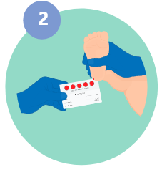
Obtain Sample:
A ) Cord Blood:No additional sample required for client’s preserving their child’s cord blood stem cells with LifeCell.
B ) Heel Prick:Few drops of blood collected hygienically from the baby’s heel and spotted onto a filter card.
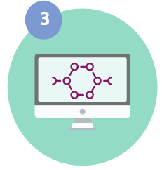
Next-Generation Sequencing:
A ) Collect Raw Data: Sequencing information of >4,000 genes will be available for analysis and reporting within a rapid turnaround time of 10 business days.
B ) Obtain Results: Your results will only be shared with the ordering Physician and made available to you online.
C ) Cloud Storage: DNA sequencing data is stored on a secure cloud environment for future use.
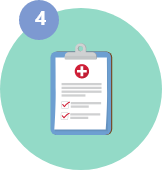
Next-Steps:
A ) Post-Test Counselling: Help you interpret the results.
B ) Future Re-Analysis: Based on change in the child’s clinical status or when new genomic information becomes available.
Payments made Easy, Secure, Simple & Accessible

100% Secure Payment
The convenient, trusted way to pay

Easy EMI Options Available
Frequently asked questions (FAQ)
DHA has been shown to be useful to both pregnant women and their babies. DHA has been associated with reduced risk of pre-term labour and better maintenance of a healthy pregnancy. In babies, it is also associated with enhanced neurological development and better overall health.
Yes! Unfortunately, testing for omega-3 DHA levels is the only way to measure its concentration in the mother’s blood. The individual differences in metabolism, absorption, and genetics make it impossible to predict with certainty how a given person will respond to supplements.
Based on your results, your doctor may recommend dietary changes such as the incorporation of fish and seafood in your diet or plant-based DHA supplements to correct your omega-3 DHA status.
Once you have been on the altered diet or supplements for a period of 4 weeks, you can take the test again.
Yes, once you buy the test online, LifeCell will promptly ship the kit to you and guide you through the rest of the process.
Unfortunately, once you have bought the kit, a return or order cancellation is not possible.
Yes, DHA has been shown to beneficial in both pregnant women and breastfeeding mothers. In fact, LifeCell’s Omega-Score N helps you measure the levels of DHA in breast milk. For more information, click here.
How does Genome-Scope work?

Prepare for Test:
A ) Pre-Test Counselling:
An in-house Genetic Counselor will help document family history whilst also clarify test benets and limitations.
B ) Order from a Physician:
This test can only be ordered by a Physician. If you’re unable to find out, LifeCell shall appoint one on your behalf at no additional cost to you.
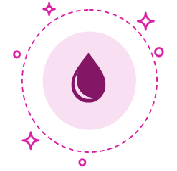
Obtain Sample:
A ) Cord Blood:
No additional sample required for client’s preserving their child’s cord blood stem cells with LifeCell.
B ) Heel Prick:
Few drops of blood collected hygienically from the baby’s heel and spotted onto a filter card.

Next-Generation Sequencing:
A ) Collect Raw Data:
Sequencing information of >4,000 genes will be available for analysis and reporting within a rapid turnaround time of 10 business days.
B ) Obtain Results:
Your results will only be shared with the ordering Physician and made available to you online.
C ) Cloud Storage:
DNA sequencing data is stored on a secure cloud environment for future use.

Next-Steps:
A) Post-Test Counselling
Help you interpret the results.
B) Future Re-Analysis:
Based on change in the child’s clinical status or when new genomic information becomes available.
Benefits of Genome-Scope
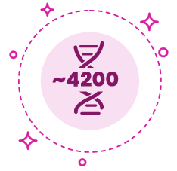
Extensive Coverage of Relevant Genes
Obtains data on 4200+ genes related to inheritable and early childhood-onset disorders using Nex-Gen DNA Sequencing technology.

Expedites Diagnostic Journey
Provides results with >95% accuracy & reduces the time required to reach an immediate diagnosis (from years to days) and thus, lowers overall costs

Guides Medicine Usage
Early diagnosis & personalized medication guidance can help reach better outcomes

Helps Plan Future Pregnancies
Genomic information obtained from the baby may be relevant to current and future siblings
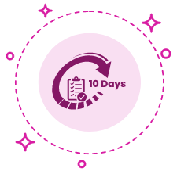
Quick Turnaround of Results
Detailed & thorough reports are shared with your doctor within 10 business days after the test

Free Genetic Counselling & Clinical Support
Genome-Scope provides you with a physician to order your test as well as free pre- & post-genetic counselling support, to address all your doubts, record your clinical history and interpret the results

Data Storage & Re-Analysis
Genome-Scope ensures raw data storage** in the cloud for future use, as well as re-analysis in future (free within the first 2 years) if a child develops symptoms or some new genomic information becomes available
Reports
Patient Details
Name: Baby of Priyanka Pandey
Gender: Female
Age: 1 day 10 hours
CRM: 200302500022
Lab ID: 985984
Specimen Details
Collected on: 26/08/2020 08:00
Received on: 28/08/2020 08:00
Report Date: 29/08/2020 08:00
Prescription Details
Test: NBS + Dual
Clinician: Dr. Yash Lokpal
Hospital: Marwary Maternity Hospital
City: Aurangabad
About this test:
Newborn screening is the practice of testing all babies in their first days of life for certain conditions that can hinder their normal development. The main purpose of the test isto enable timely treatment even before symptoms appear so as to manage these conditions much more effectively and thereby preventing the harmful manifestations of the conditions. We looked at 180+ analytes associated with over 111+ health conditions and the results of your baby are as below
Results Summary:
Your baby's Result: POSITIVE Baby is at elevated risk for one or more condition
Disease Category
Hormonal
Endocrine
Metabolic
Blood
Others
Conditions Tested
5
2
30
2
2
Result
Elevated Risk
Elevated Risk
Low risk
Low risk
Low risk
Reference*
Annexure 1
Annexure 2
Annexure 3
Annexure 4
Annexure 5
*The list of analytes tested and corresponding results are available in Annexure 1 to 4
Clinical Notes:
Blood Transfusion: Yes
Transfused on: 28/08/2020 08:00
Special Feeds / IVF /TPN/ Supplements: No
Pre-term
Baby's weight: 2.9 kg
Recommendations:
Genetic counselling is recommended for further interpretation of the positive findings.
Visit www.lifecell.in or Call 1800 2665533 to fix an appointment and talk to our genetic counselor.
 test web url link
test web url link
widgets
test widget product
test cms page link
cms page linktest cms page link
test cms static block widget
Omega Score-N Reports
DHA Content
Breast Milk DHA
Docosahexaenoic acid (DHA)
measured in %
Below Criteria
Borderline
Above Criteria
Your Breast Milk DHA score:
Above Average
Result Value:
Equal to 0.57%
Reference range:
Should Not Be Less Than 0.22%
What does your DHA score mean?
The analysis of your Breast Milk for DHA by OmegaScore-N is above the target DHA levels. Global dietary guidelines recommend consume atleast two servings of Fish / Vegetarian source DHA / DHA supplements per week.
Recommendation:
We recommend that you continue with your diet/supplement regime
store id
2